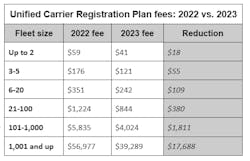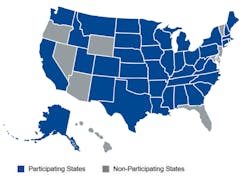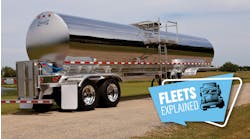The Federal Motor Carrier Safety Administration (FMCSA) will decrease Unified Carrier Registration-related fees collected by states from motor carriers, brokers, freight forwarders, and leasing companies. The new UCR Plan would cut 2023 registrations between $18 and $17,688 per entity, depending on fleet size, compared to 2022 figures.
According to a Federal Register filing detailing the new plan, 41 participating states will begin collecting the new fees on Oct. 1 for the registration year 2023.
A 2007 UCR agreement requires fee adjustments when registration revenues collected in previous years exceeded the maximum annual revenue of $107.78 million distributed among the 41 states, plus administrative costs.
That excess revenue will be applied to future registrations, which allows the new reduced fees. Depending on fleet size, fee reductions range between 30.5% and 31.25%. In 2018, the UCR Board of Directors reduced fees by about 9%, citing higher-than-expected collections.
The UCR Act, established in 2005, requires carriers and other businesses involved in interstate commerce to submit annual fees based on fleet size to supplement funding for state highway motor carrier registration and safety programs.
OOIDA says UCR wasn't lowered enough
The Owner-Operator Independent Drivers Association (OOIDA) told regulators that the fees should be reduced further. OOIDA argued that the UCR Board had amassed $42 million in extra collections that, due to a federal statute mandating that any surplus funds collected must be used to reduce fees for the following year, should be used to lessen the payments required by carriers.
"The UCR Board's failure to apply its accumulating surpluses to reduce the UCR fees each year since 2020 means that the fees collected in 2021 did not and the fees being collected today for 2022 do not comply with the UCR statute and are too high," OOIDA stated in its public comment filing. "FMCSA must suspend the continued imposition of the 2020 fee structure as contrary to law to stop the ongoing imposition of unlawfully high fees."
See also: 10 laws that changed how trucking works
The UCR Board's response to OOIDA said the excess funds were kept by the law to cover administrative costs and that "the policy reflects a legitimate exercise of the Board's powers of governance … and sound fiscal management in accordance with its fiduciary responsibilities to the plan."
Four-truck fleet Jane's Trucking told FMCSA: "Small-business truckers are already excessively taxed, tolled, and are now facing historically high diesel prices. FMCSA must keep UCR fees as low as the law requires. I couldn't agree more to what OOIDA has written."
B. L. Reever Transport, another small fleet with four power units, supported the reduced fees but commented: "While the plan is inherently unfair to smaller carriers or any carrier at the low end of the tier or class on a per-truck basis, I'm glad to see the fees being reduced."
The Western States Trucking Association (WSTA), an industry group representing small-business trucking, questioned why smaller fleets with 20 or fewer vehicles pay what is, in their view, an unfairly high proportion of UCR fees.
"Clearly, a reduction in UCR fees is warranted, however, we question how the UCR Board arrived at a decision to use fees primarily paid by small-business motor carriers to reduce the UCR fees equally in all brackets," WSTA commented.






